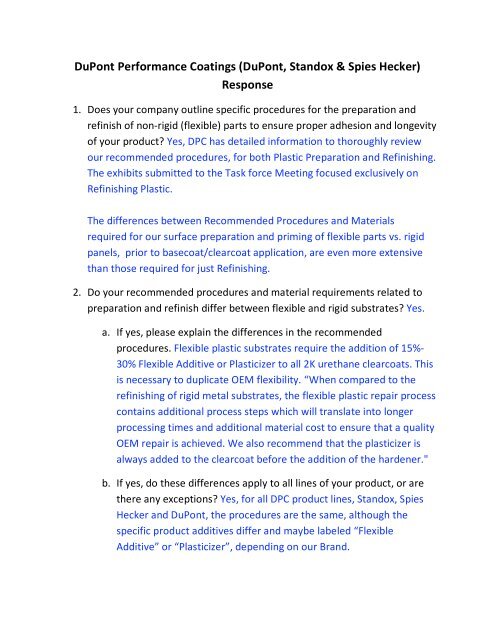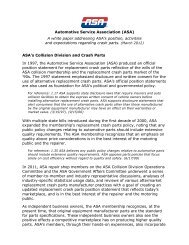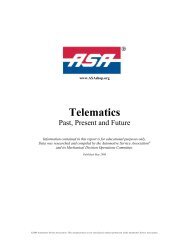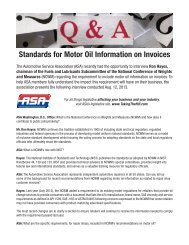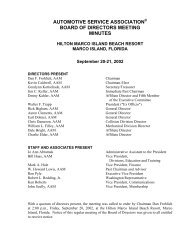DuPont Performance Coatings (DuPont, Standox & Spies Hecker ...
DuPont Performance Coatings (DuPont, Standox & Spies Hecker ...
DuPont Performance Coatings (DuPont, Standox & Spies Hecker ...
You also want an ePaper? Increase the reach of your titles
YUMPU automatically turns print PDFs into web optimized ePapers that Google loves.
<strong>DuPont</strong> <strong>Performance</strong> <strong>Coatings</strong> (<strong>DuPont</strong>, <strong>Standox</strong> & <strong>Spies</strong> <strong>Hecker</strong>) <br />
Response <br />
1. Does your company outline specific procedures for the preparation and <br />
refinish of non‐rigid (flexible) parts to ensure proper adhesion and longevity <br />
of your product Yes, DPC has detailed information to thoroughly review <br />
our recommended procedures, for both Plastic Preparation and Refinishing. <br />
The exhibits submitted to the Task force Meeting focused exclusively on <br />
Refinishing Plastic. <br />
<br />
The differences between Recommended Procedures and Materials <br />
required for our surface preparation and priming of flexible parts vs. rigid <br />
panels, prior to basecoat/clearcoat application, are even more extensive <br />
than those required for just Refinishing. <br />
2. Do your recommended procedures and material requirements related to <br />
preparation and refinish differ between flexible and rigid substrates Yes. <br />
a. If yes, please explain the differences in the recommended <br />
procedures. Flexible plastic substrates require the addition of 15%‐<br />
30% Flexible Additive or Plasticizer to all 2K urethane clearcoats. This <br />
is necessary to duplicate OEM flexibility. “When compared to the <br />
refinishing of rigid metal substrates, the flexible plastic repair process <br />
contains additional process steps which will translate into longer <br />
processing times and additional material cost to ensure that a quality <br />
OEM repair is achieved. We also recommend that the plasticizer is <br />
always added to the clearcoat before the addition of the hardener." <br />
b. If yes, do these differences apply to all lines of your product, or are <br />
there any exceptions Yes, for all DPC product lines, <strong>Standox</strong>, <strong>Spies</strong> <br />
<strong>Hecker</strong> and <strong>DuPont</strong>, the procedures are the same, although the <br />
specific product additives differ and maybe labeled “Flexible <br />
Additive” or “Plasticizer”, depending on our Brand.
3. Do your recommended procedures provide for using the identical additives <br />
and processes on rigid panels (ex. Fenders) that would be used on flexible <br />
panels (ex: Bumper Covers) DPC does NOT recommend the use of <br />
plasticized clear on rigid substrates, as it will add additional material <br />
expense and often slow down dry time and re‐assembly <br />
4. Do you require/train/instruct repair facilities to follow your company’s <br />
recommended procedures in order to ensure a proper application of <br />
refinish and/or in order to be warranted Yes, DPC offers certification for <br />
the refinish technician based on the completion of DPC training classes <br />
which are based on DPC recommended procedures and specific product <br />
use. <br />
5. Might a warranty claim be denied if it was determined that the repairer had <br />
not followed approved procedures Yes. Although DPC reviews each <br />
warranty on a case‐by‐case basis and makes the determination on a <br />
number of factors; failure to use the recommended products as well as, the <br />
approved mixing and application procedures would generally void any <br />
warranty claim. <br />
* Dupont did not participate in the meeting, but did furnish printed materials <br />
for the meeting. The responses above were extracted from these materials, as <br />
well as through conversations with DPC representative Bruce Cooley. This <br />
statement has been edited and was approved by Bruce Cooley on 2/24/2009. <br />


